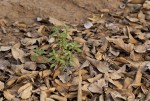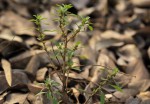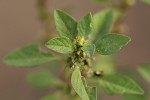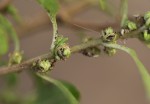| Home | > | List of families | > | Amaranthaceae | > | Amaranthus | > | graecizans |
Amaranthus graecizans
silvestris
Selected images: Click on each image to see a larger version and details of the record View all images (5)
Detailed records: Display species records QDS maps by: Google Maps Point records by Google Maps
Species details: Click on each item to see an explanation of that item (Note: opens a new window)
| Synonyms: |
Amaranthus angustifolius M.Bieb. ex Willd. var. silvestris (Vill.) thell. Amaranthus angustifolius M.Bieb. ex Willd. subsp. silvestris (Vill.) Henkels Amaranthus graecizans L. var. silvestris (Vill.) Asch. Amaranthus silvestris Vill. |
| Common names: | |
| Frequency: | |
| Status: | |
| Description: |
Annual branched herb, erect, decumbent or prostrate, mostly up to c. 45 cm high, rarely taller. Stem angular, hairless or more or less thinly hairy upwards, especially in the inflorescence. Leaves broadly ovate or rhomboid-ovate to narrowly linear-lanceolate, 4–55 mm long, hairless or with sparse gland-like hairs on the principal veins beneath; petiole from 3–45 mm long sometimes longer than the leaf blade. Flowers all in axillary clusters, male and female intermixed, male commonest in the upper clusters. Bracts and bracteoles narrowly lanceolate-oblong, pale-membranous, acuminate and with a pale or reddish tip formed by the extended green midrib. Perianth segments 3, 1.5–2 mm long, lanceolate-oblong or linear-oblong. Capsule subglobose to shortly ovoid, 2–2.25 mm long, usually strongly wrinkled throughout with a very short, smooth beak. |
| Type location: |
|
| Notes: | |
| Derivation of specific name: | |
| Habitat: | |
| Altitude range: (metres) | |
| Flowering time: | |
| Worldwide distribution: | This subspecies is found throughout most of Africa except South Africa, the warmer parts of Europe and the cooler regions of Southwest Asia and Northwest India. |
| National distribution: | |
| Growth form(s): | |
| Endemic status: | |
| Red data list status: | |
| Insects associated with this species: | |
| Spot characters: | Display spot characters for this species |
| Literature: |
Mapaura, A. & Timberlake, J. (eds) (2004). A checklist of Zimbabwean vascular plants Southern African Botanical Diversity Network Report No. 33 Sabonet, Pretoria and Harare Page 16. Townsend, C.C. (1988). Amaranthaceae Flora Zambesiaca 9(1) Pages 48 - 57. (Includes a picture). |
Other sources of information about Amaranthus graecizans subsp. silvestris:
Our websites:
Flora of Malawi: Amaranthus graecizans subsp. silvestrisFlora of Mozambique: Amaranthus graecizans subsp. silvestris
Flora of Zambia: Amaranthus graecizans subsp. silvestris
Flora of Zimbabwe: Amaranthus graecizans subsp. silvestris
External websites:
African Plants: A Photo Guide (Senckenberg): Amaranthus graecizansAfrican Plant Database: Amaranthus graecizans
BHL (Biodiversity Heritage Library): Amaranthus graecizans
EOL (Encyclopedia of Life): Amaranthus graecizans
GBIF (Global Biodiversity Information Facility): Amaranthus graecizans
Google: Web - Images - Scholar
iNaturalist: Amaranthus graecizans
IPNI (International Plant Names Index): Amaranthus graecizans
JSTOR Plant Science: Amaranthus graecizans
Mansfeld World Database of Agricultural and Horticultural Crops: Amaranthus graecizans
Plants of the World Online: Amaranthus graecizans
Tropicos: Amaranthus graecizans
Wikipedia: Amaranthus graecizans
| Home | > | List of families | > | Amaranthaceae | > | Amaranthus | > | graecizans |




